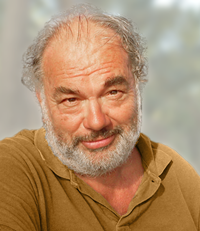What is Dark Eros
“The act of transgression breaks through the barriers of fear and shame, and that moment of liberation creates a charge of energy on which we can ride to heights of pleasure and ecstatic experience. It also asserts a sense of self as independent of social norms, a sense of individuality.” – John Hawken
In the tantric world vision our sexuality is sacred: it is our direct route to experience the divine, whether in ourselves, in the other, or in the ecstatic experience of oneness with the energy of the universe. If you cannot see God in your beloved, where will you see him? And by the same token, seeing your beloved as a mirror of your self, as you embrace your partner you embrace the god or the goddess in yourself.
But the story of Adam and Eve describes our loss of innocence and the cultural acceptance of sexual energy (the symbol of the serpent) and the feminine (the symbol of the apple) as sinful and shameful, and as an experience that leads us away from the sacred and the spiritual. In this sense all eros becomes dark.
Tantra describes exactly the difference between the experience of innocent, spiritual sexuality, and the experience of pleasure as something tabu, something forbidden. Even if the tabu is not consciously accepted, yet unconsciously it informs the quality of our pleasure.
Innocent sexuality manifests in the body as energy and excitement experienced in a state of relaxation. We experience a pleasurable expansion of our energy body, which connects us with ourselves as beings of light, of energy, of fire. We know sexuality as something we are, which is one with the life force streaming through the universe. So pleasure in this relaxed, expanded state of non-doing is the path to an experience of bliss as our birthright: sat chit ananda, truth as the consciousness of bliss.
Forbidden sexuality manifests in the body as excitement with tension, with a contraction of the muscles, especially of the muscles of the pelvic floor. This tension gives us the impression of increased excitement, but at the same time sets physical boundaries to our sexual energy and therefore to our experience of pleasure, confining it more or less to the genital area. The contraction of the muscles takes us into an experience of doing, of performance, rather than of being: our focus is on having sex, completing the sexual act, rather than on enjoying being sexual and celebrating our aliveness. Moreover the contraction of energy invokes an experience of anxiety, as bioenergetically speaking, excitement with contraction creates fear: this reflects our ambiguity towards our sexual energy, whether this ambivalence is conscious or not. The tension around the genitals prevents the pleasurable expansion of more and more sexual charge, and leads instead to the discharge of the excitement in a genital orgasm, or perhaps more distressingly, the experience of frustration as the excitement is suppressed and blocked by the tension.
The much sought after experience of orgasm, statistically all of 8 to 12 seconds in duration, can, especially for men, mirror again our ambiguity towards our sexuality, in that the highest point of enjoyment of our excitement is the moment of getting rid of it. Afterward, we can finally relax from the chronic tension that controls us, which is relieved by the discharge, though perhaps with a touch of the sadness that Ovid describes in his “Ars Amandi” , “post coitum omne animal triste est”, a sense of lost opportunities, of having sold ones birthright for a mess of porridge.
For women this experience is less extreme as the discharged excitement stays more in the body, but for both sexes learning to relax into the excitement increases our ability to contain more and more pleasurable energy within ourselves. This is not possible very far without healing the tensions which are created by the stigma and tabu against pleasure in our society.
So in a sense all our sexual expression that is not consciously tantric, expansive and innocent, is dark. This darkness, however, remains outside our awareness, which accepts the tension and its accompanying anxieties and ambiguities as normal. With the term dark eros we invite an exploration of all of our sexual expression that is consciously transgressive, that investigates the particular flavour of forbidden fruit.
The consciousness of transgression creates an additional excitement, the charge of energy that comes from the breaking of tabus, from the act of rebellion, from the excitement of daring and of naughtiness. Now, if we use the transgression as a quick fix of energy, acting out our BDSM rituals, identifying with them, creating clubs and fetishes to announce our belonging, while at the same time flaunting our unconventionality, then we reinforce the conventions and indeed the morality of the system we seem to buck. The thrill of the forbidden needs the act of forbidding to produce the thrill. The repetitive rituals celebrate the tensions by finding pleasure in the stimulation of embracing them. As custom and familiarity produce appetites that become more jaded, greater transgressions must be sought, and a spiral of the need for ever greater and greater stimulation is created.
In this intensive training we are aware of the forbidden nature of sexuality in our culture and the resulting tension in our own bodies, although our personal philosophies embrace the path of spiritual sexuality. We use dark eros, the conscious excitement of transgression, to transcend and heal the tensions that create this ambiguous excitement. Through the rebellious sabotage of the moral system by finding pleasure in the tensions, while yet seeking to move through the pleasure of tension into the pleasures of expansion and relaxation, we can disempower the social conditioning that keeps us small and our sexual pleasure limited. We move through the need for intensity from and with others into a need-free experience of our own expanded being-in-pleasure. The key is to enjoy yet remain unattached to the dark pleasures, being caught neither by the net of morality nor by the hook of addiction.
The system that sees sexuality as evil, making us a bad person if we enjoy sexual pleasure, is driven psychologically by the internalized states of unworthiness, shame and guilt. If you don’t recognize the starkness of “sex is evil”, try a more subtle form eg “too much pleasure is selfish”, “I don’t deserve…”, or “there are more important things to do”, and see if they are more familiar and recognizable. Nowadays the prohibitions rarely stop us, but they can certainly diminish our pleasure and spoil our fun.
The first step of transformation is to use our consciousness to deny the morality its validity and its power. Do we think sexuality is evil? If we reply in the affirmative, then we agree with the system and therefore have nothing to transform. If we reply in the negative, our consciousness is ready to make the jump, but our energy will need a few stepping stones to make the crossing from original sin to innocence. The first stepping stone is to shift from the position of “enjoying sex is bad” to that of “enjoying sex is naughty”. Instead of the transgression being moral, it becomes a personal rebellion against authority, an act of independence. This attitude also energizes the anal phase of our sexuality, when the sexual excitement comes into the first chakra as an exciting standing on our own feet, defying the rules, allowing the tension between us and the other to become thrilling.
Naughtiness provokes punishment, either destructive or affirming. A destructive punishment seeks to repress our naughtiness by creating fear in us: it might take the form of uncontrolled physical violence, or of psychological violence such as rejection and the withdrawal of love. This repression and fear creates a tension in our first chakras which cannot be easily relaxed or released. An affirming punishment recognizes that we have been naughty, celebrates the excitement of the tension in our first chakra as we stand up as an individual against authority, and asserts that authority without destroying or diminishing us. Our naughtiness becomes heroic, life-affirming. The affirming punishment needs to meet the excitement in the first chakra intensely enough to increase it, to carry the energetic charge of a punishment while staying essentially safe and respectful. So the erotic punishment is born.
An erotic punishment sabotages the moral and authoritarian systems by giving the receiver of the punishment sexual pleasure. It takes the appearance and form of a physical, bottom-centred punishment, but energetically it is experienced as an erotic game, a warm and intense contact which gives pleasure to both partners equally. There is no attachment to role, and both partners need to be able to switch, that is to give or receive with equal facility. By affirming and rewarding the naughtiness the controlling system is sabotaged and made a nonsense of.
“Do that again and Ill have to punish you!”
“Oh yes please, how about I do it again tomorrow?”
“Great, look forward to punishing you again!”
“It is a deal.”
The very movements of the one receiving the physical punishment become sexual movements of surrender to the energy and the excitement, legitimized, even enforced, by the “punishment”.
From the point of view of the giver, s/he too creates a transformation by abandoning the moral position, that of being right and of having rights over the other (e.g., to punish them), to that of wanting to punish simply to have pleasure in it. When sexual pleasure is denied, the most usual sublimation of its energy is into the form of morality and power. This creates the absurdity of a society where sex workers struggle for legitimacy while to be a soldier, a professional killer, is an honourable and distinguished career. Exploring the dark eros of giving an erotic punishment is one form of transforming power back into pleasure. The more we allow and embrace the sexual pleasure in power, the less perverse it becomes, as pleasure replaces the need for the violence that arose as a response to its prohibition. True perversion is the use of power while being in denial of pleasure; the more the pleasure becomes open and accepted and embodied as sexual excitement rather than as mental stimulation, the less need we have for power over, for moral justification, and for other forms of violence. The power to give pain becomes the power to give pleasure, which in its turn becomes the pleasure in giving pleasure.
As we explore the dark eros of power over and power under, whether as punishment or in other forms such as bondage, we discover the spiritual impulses that underlie it. The desire to surrender, to give oneself, is a deep spiritual urge. So is the desire to use power consciously. So is the desire to go beyond the body and experience intense energy and ecstatic movements.
We begin with the excitement of tension that is the conscious base of dark eros, but as we experience the transformation into a pure erotic meeting which is a celebration of intense energy, we experience a coming home, an awareness of sexual energy as the place where we belong, as the centre of our being. This recognition is accompanied by a deep relaxation, a harmony, and that blissful expanded energized state
That is the very heart of tantra.
- John Hawken







